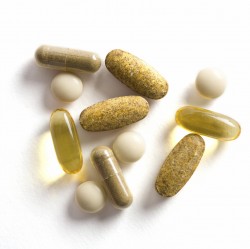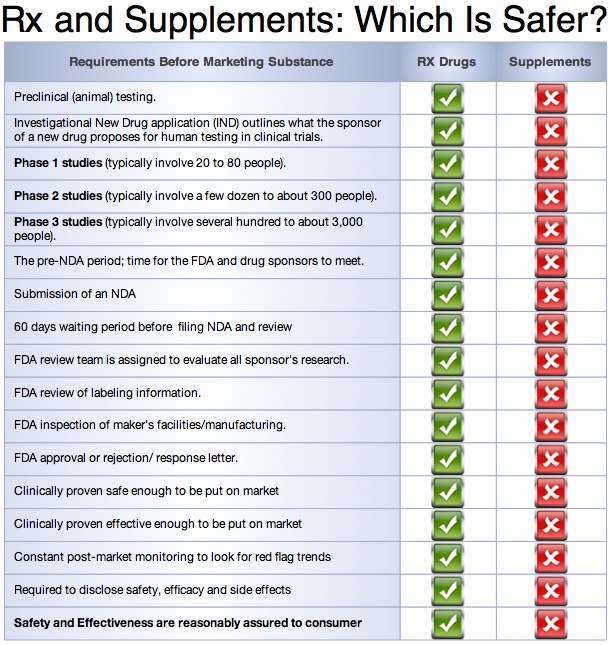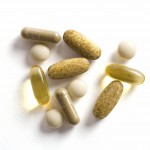 We often hear people recommending supplements to one another, especially in regard to the therapeutic treatment of HSV and HPV. There seems to be a pervasive belief in society that since supplements don’t require a prescription, they’re more natural or healthful and may not be nearly as harmful as prescription pharmaceuticals. Is that really the case, though?
We often hear people recommending supplements to one another, especially in regard to the therapeutic treatment of HSV and HPV. There seems to be a pervasive belief in society that since supplements don’t require a prescription, they’re more natural or healthful and may not be nearly as harmful as prescription pharmaceuticals. Is that really the case, though?
Many rumors float around touting the seemingly dangerous side effects of approved drugs, without giving any consideration whatsoever as to the complete lack of documentation proving either the effectiveness or the side effects of the unapproved drugs; things which supplement companies don’t even have to bother researching, much less reporting. They can put pretty much anything in a capsule and tell you it’s the secret to longevity and health… and if social media is any indication, people actually believe them.
Let’s think about that for a moment. The natural substance which someone told you they heard/read was good, with no actual research documenting its effectiveness or its dangers is deemed to be healthful and safe, while another substance, also derived from nature, which actually has been put through the ringer in order to prove that it’s reasonably safe and effective is vilified, while rumors abound that it’s unsafe and ineffective. Does that make any logical sense?
Here’s a checklist of what steps suppliers must go through before marketing their substances.

That’s not to say supplements are completely unsafe or completely ineffective.
It only means you don’t actually know:
- How safe they are
- How effective they are in the treatment of your condition
- What interactions they may have with other supplements or drugs
- How much of the active ingredient is actually in the container or the dose
- What types of fillers are used in the product
- How pure the ingredients are
- What other ingredients may be in the product
- What side effects they may have
- How much of the product must be taken in order to achieve the desired result
- How much of the product one can actually take before doing self-harm (toxicity, overdose, liver damage, etc)
So… what if supplements manufacturers were actually required to research and document such things? Well, we’ll give you one example. Here is what the warning label for St. John’s Wort – a common supplement – would look like:
St. John’s Wort Warnings and Precautions
Extensive research supports the safe use of St. John’s wort for a short duration (<3 months) at recommended doses in individuals that lack other medication intake.
-
St. John’s wort may cause anxiety, headache, muscle cramps, sweating, weakness, dry mouth, or skin irritation.
-
Use with caution when using St. John’s wort with drugs metabolized by cytochrome P450, as decreased drug effectiveness may occur.
-
St. John’s wort may increase the risk of photosensitivity. Use cautiously in people with sensitive skin or those taking photosensitizing drugs.
-
St. John’s wort may increase the risk of serotonin syndrome. Use cautiously in people taking agents that increase the risk of serotonin syndrome.
-
St. John’s wort may result in altered menstrual flow, bleeding, unwanted pregnancies, and hormone level changes. Use cautiously in women taking contraceptives or other estrogen agents by mouth.
-
St. John’s wort may alter drug levels. Use cautiously in people taking agents for bacterial or fungal infections, agents for erectile dysfunction, antianxiety agents, antihistamines, fertility agents, P-glycoprotein agents, pain relievers, or theophylline.
-
St. John’s wort may cause mania or psychosis. Use cautiously in people with mental illnesses and those taking antipsychotics.
-
St. John’s wort may change how sugar is processed in the body. Use cautiously in people with diabetes or in those taking anti-diabetic agents.
-
St. John’s wort may cause high levels of thyroid-stimulating hormone (TSH). Use cautiously in people with thyroid disorders or those using thyroid hormones.
-
Use cautiously in people with cataracts, due to the potential association between an element in St. John’s wort and cataracts.
-
St. John’s wort may cause heart burn, loss of appetite, diarrhea, nausea, vomiting, and constipation. Use cautiously in people with stomach and intestine problems.
-
St. John’s wort may cause liver damage. Use cautiously in people with liver problems or those taking agents that damage the liver.
-
St. John’s wort may alter blood pressure and cause increased or uneven heart rate. Use cautiously in people with high blood pressure or abnormal heart rhythms.
-
St. John’s wort may cause swelling. Use caution in people prone to swelling.
-
St. John’s wort may cause dizziness, tiredness, insomnia, problems with the nervous system, skin tingling or prickling, and nerve pain. Use cautiously in people taking agents that affect the nervous system.
-
St. John’s wort may lower the seizure threshold. Use cautiously in individuals with seizures, and drugs that may lower the seizure threshold.
-
St. John’s wort may lower cholesterol drug concentration and may increase cholesterol. Use cautiously in people with high cholesterol and those taking agents to lower levels of cholesterol.
-
St. John’s wort may stimulate release of certain hormones. Use cautiously with hormonal agents.
-
Avoid in people with a known allergy or sensitivity to St. John’s wort or to any of its parts.
-
St. John’s wort has decreased levels of drugs for HIV/AIDs. Avoid in people with HIV/AIDS who are taking protease inhibitors or non-nucleoside reverse transcriptase inhibitors, as suggested by the U.S. Food & Drug Administration (FDA).
-
St. John’s wort has decreased levels of drugs that suppress the immune system. Avoid in individuals receiving transplants and taking agents that suppress the immune system (particularly cyclosporine).
-
Avoid in people with suicidal thoughts.
-
St. John’s wort resulted in difficulty inducing anesthesia and relaxation. Avoid before surgery.
-
St. John’s wort use with cancer agents may result in reduced effectiveness and treatment failure. Avoid in people using cancer agents.
-
St. John’s wort may result in result in reduced digoxin efficacy. Avoid using with cardiac glycosides such as digoxin.
-
St. John’s wort may decrease effectiveness of agents that thin blood. Avoid use in people with bleeding disorders or in those taking drugs that thin blood.
-
Avoid in pregnant and lactating women due to a lack of information.
Those are the actual known side-effects of one simple, natural supplement. (To read all the additional drug interaction issues, click here.) However, the manufacturer/seller isn’t required to tell you any of that stuff, specifically because it’s only labeled as a supplement. Supplements seem healthier – and people believe they are – for one simple reason: they aren’t required to tell you any of the bad stuff; they aren’t even required to research it and find out whether it is good or bad for you.
And yet, people readily take supplements and “natural” remedies without a second thought, because someone told them that they read/heard somewhere they might help. With no testing, no assurance of safety or efficacy, no assurance of quality, regulation of ingredients or labeling regulation.
We should really think about what “safe” actually means before assuming supplements are safe or effective… and definitely before accusing FDA-approved treatments of being unsafe and/or ineffective.
What you don’t know actually can hurt you. Potentially, quite a bit more. We’re certainly not against supplements. We take them ourselves. We just want you to understand the reality of both the approved and unapproved treatment markets. The majority of approved Rx drugs are nothing but supplements – “natural treatments” – which have been put through some very strict controls and had to prove an awful lot, beyond any reasonable doubt, before ever hitting the market.
Acyclovir, in fact, is actually “Caribbean Sea Sponge Extract”.
Whatever you put into your body, do your research. Certainly, many supplements have been around for a long time and actually have been studied for their effects on human beings, both good and bad. To learn more about their characteristics may be, here are a few helpful sites:
National Center for Complementary & Alternative Medicine
National Library of Medicine – National Institutes of Health
Sources:
Mayo Clinic Health
Natural Standard Research Collaborative









[…] Valtrex has been proven quite safe and effective. Now, for something really scary, go look at What Supplements Would Say if They Required Warning Labels […]